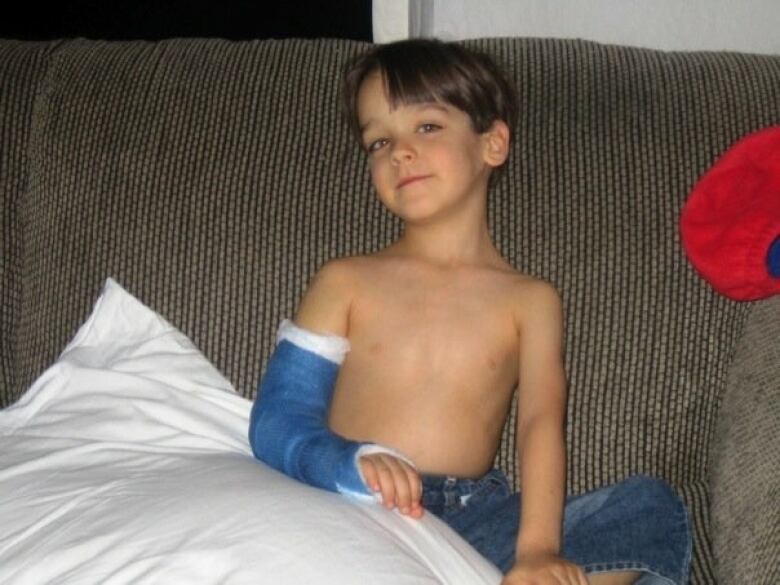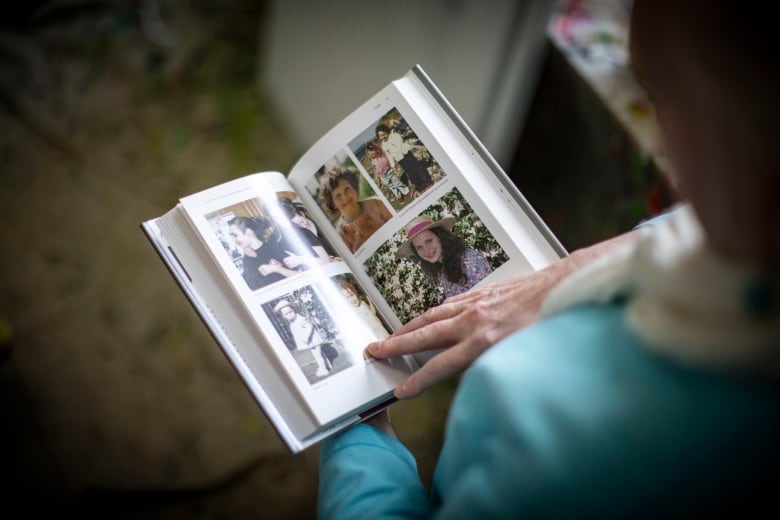Families ask why B.C. surgeon still allowed to see patients after string of negligence claims | CBC News
It was just a broken arm. Countless five-year-olds have had one, and in most cases, they recover just fine after a few uncomfortable weeks in a cast or splint.
But when Max McKee broke his arm falling from a kitchen cabinet in 2006, that didn’t happen. His fracture was treated at B.C.’s Langley Memorial Hospital by orthopedic surgeon Dr. Tracy Eugene Hicks, who didn’t set the bones properly before placing them in a cast, leaving McKee with a lifelong deformity, according to a court judgment.
Now 21, when McKee holds his right arm out to the side, his forearm hangs downward from the elbow at an awkward angle, causing him regular pain and years of self-consciousness as a teenager.
“The job I’m working right now, as an electrician, I’m constantly twisting my arm, screwing in lightbulbs — anything using a screwdriver, it’s uncomfortable, and on a daily basis,” he told CBC.
“There’s nothing I can do about it. I can’t fix it.”

Earlier this month, the B.C. Court of Appeal ordered Hicks to pay more than $360,000 in damages for his negligent treatment of McKee’s arm.
It was one of two decisions released by B.C. courts in the span of just one month concerning Hicks’s medical negligence. In the second, Hicks was found to be negligent in his follow-up care for an older woman who had surgery for a broken hip, causing her months of pain.
Those cases follow a long string of malpractice allegations made in court throughout Hicks’s career. Patients and their families have been raising concerns for decades, asking why Hicks is allowed to continue practising, including one grieving mother who questions whether his actions played a role in her daughter’s death.
McKee’s mom Stacey says she wishes she’d known about Hicks’s history when she trusted him with her son.
“When you present to a hospital in an emergency situation, you do not get to pick and choose who your doctor is,” she said.
“The College [of Physicians and Surgeons of B.C.] has a duty, and so does the hospital, to make sure that the person that you are seeing is qualified and capable.”
Through his lawyers, Hicks declined an interview for this story, and he did not respond to a detailed list of questions about his history of negligence allegations.

Court records show that Hicks had already been named as a defendant in more than a dozen lawsuits by the time Max McKee arrived at the hospital in 2006.
That included a case where he’d performed unnecessary wrist surgery that left a patient with an “essentially … functionless” right hand and another in which he negligently severed a nerve “as big as a spaghetti noodle” during knee surgery.
In the last 10 years alone, seven civil suits accusing Hicks of causing harm to patients have concluded before trial by mutual agreement between the parties on terms that are not public.
His responses to most of those lawsuits denied any negligence, describing his treatment of the patients as appropriate and standard for the circumstances.
But in one case, Hicks admitted that he mistakenly performed a hip replacement in 2016 on a woman who actually needed a knee replacement.
No public records of discipline
Susanne Raab, a medical malpractice lawyer at Pacific Medical Law in Vancouver and adjunct law professor at the University of B.C. who has never acted for or against Hicks, confirmed that the number of negligence lawsuits against Hicks is “higher than usual” for an orthopedic surgeon.
Raab told CBC in an email that there’s a disconnect between negligence findings in court — with legal expenses and damages often covered by the Canadian Medical Protection Association — and a doctor’s ability to practise.
She said it’s up to the college to ensure doctors in B.C. are qualified, competent and ethical.
“Where they receive information that a physician is practicing in an incompetent, unsafe or unethical manner, they have an obligation to step in, to investigate the circumstances and to respond in a manner that ensures the public is adequately protected,” Raab said.
She noted that the college was sued in 2014 for failing to suspend Hicks’s licence, but the claim was dismissed by a judge.
Hicks remains a fully licensed doctor in B.C., with no restrictions on his practice, according to the college website, which also shows no records of disciplinary action.
However, college spokesperson Susan Prins told CBC that Hicks has signed voluntary undertakings restricting his practice to assisting with surgery and working in an office-based setting. It’s not clear when he signed the restrictions.
“Neither of these undertakings arose from discipline,” she wrote.
Asked to comment on whether the college is fulfilling its responsibility to protect the public, Prins said, “the placement of restrictions on a registrant’s practice is the true public protection measure.”
Records shared with CBC confirm that Hicks received a formal reprimand from the college and signed an undertaking preventing him from setting children’s broken bones as a result of a complaint from Stacey McKee.
Earlier, a decision from the Hospital Appeal Board notes that Hicks was placed on the college’s temporary register in 1993 on terms that required him to undergo psychotherapy and work under the supervision of a mentor. It’s not clear when those restrictions were lifted.
Prins explained that under B.C. law, none of those measures meet the bar for public notification.
The most recent edition of the province’s Blue Book shows that Hicks billed $241,686 to public health insurance in 2021-2022.
However, he no longer has surgical privileges at Langley Memorial or any hospital in the Fraser Health region, a health authority spokesperson said.
‘His career should have ended’
A full 23 years ago, Hicks’s history of negligence was the subject of a front-page exposé by Vancouver Sun reporter Rick Ouston. Hicks did not agree to an interview for that story either, but his lawyer told the newspaper that he had performed about 30,000 surgeries at that point and had many grateful patients.
At the centre of that investigation was the 1997 death of 17-year-old Heidi Klompas, whose legs were broken when a drunk driver plowed into a group of teenagers at Stokes Pit in Surrey.
Hicks was the orthopedic surgeon on call for emergencies when Klompas was taken to Peace Arch Hospital in White Rock.
The girl’s mother, Catherine Adamson, still questions whether Hicks is partially responsible for Klompas’s death because he didn’t appear at hospital until about seven hours after he was asked to come in.
“It’s been 25 years since my daughter died,” Adamson said in a recent interview. “His career should have ended around then, but he keeps going.”

The 1999 coroner’s report does not lay any blame for the death but says the proximal cause was something called a fat embolism, which led to a seizure that put Klompas into a coma for the rest of her short life.
A fat embolism is a rare and sometimes fatal condition where fat from bone marrow leaks into the blood after bones are broken. The coroner’s report notes that the best prevention for fat embolism is quick treatment of long bone fractures.
The attending emergency physician on the night of the crash told the coroner she made four calls to Hicks “expressing extreme concern” about Klompas’s need for an assessment, the report says. A nurse on duty corroborated that version of events, but Hicks said he could only recall one phone call.
Watch | CBC News reports on Heidi Klompas’s death after 1999 coroner’s report:
In this archival story reported by Belle Puri of CBC News, Catherine Adamson reacts to the release of the coroner’s report about her daughter’s death.
Klompas ultimately died a few weeks after the crash from blood loss when her tracheostomy tube pierced an artery in her neck, the coroner’s report says.
Adamson said she’ll never know for sure if her daughter would have survived with quicker treatment of her broken legs.
“I’m disappointed in our medical system,” she said.
Adamson filed a complaint about Hicks with the college as well, but it was dismissed in a letter telling her “there was no requirement for Dr. Hicks to have attended the hospital immediately.”

Raab, the malpractice lawyer, pointed out that in addition to the college’s public protection role, health authorities can also limit a doctor’s ability to practise by revoking hospital privileges.
Decisions from the Hospital Appeal Board show that Langley Memorial Hospital and Peace Arch Hospital both attempted to restrict Hicks’s privileges a number of times over the years, with mixed results.
The most recent case was decided in 2013 when the board upheld a Fraser Health decision to remove Hicks from Peace Arch’s regular emergency on-call schedule.
In the end, though, both the McKees and Adamson say they feel let down by all of the systems meant to prevent doctors from causing harm.
“These people have a duty to protect the public, and I don’t think in this situation that they did a very good job,” Stacey McKee said.
For all the latest health News Click Here


